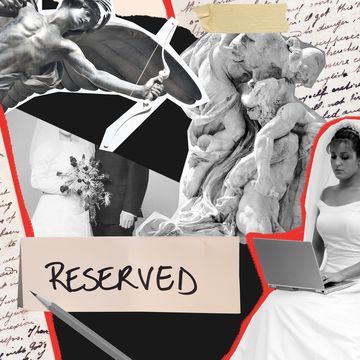Here's a scenario that's far more common in my life than I care to admit: I text my friends asking if they'd like to meet for brunch or dinner, and the text just hangs there, unanswered for days. Or I e-mail my boss with a question, only to watch her respond to group e-mail threads, but selectively ignore my own message even though it's clear she's seen it.
I should just accept it, shouldn't I? According to Dr. Jean Twenge, author of Generation Me and a psychology professor at San Diego State University who studies millennial generational trends, ignoring is quickly becoming the new norm among my peers. It's devastatingly, but inevitably, becoming standard.
Related: Would You Give Up Texting For Love?
Why It Happens
It's because of technology, isn't it? Dr. Alex J. Packer, author of the manners guide How Rude!, points out, "If a query comes via text or Facebook, it's much easier to ignore; your smartphone isn't going to burst into tears if you don't respond." And we're also just busier, not necessarily ruder. "The new frontier has stretched into 24 hours," says Patricia Rossi, the author of Everyday Etiquette. "We have to make snap decisions because of how busy everyone is. So much more is expected."
Sure, but Dr. Twenge insists it's more than that. An increase in anxiety, depression, and narcissism along with decreases in empathy and social desirability (how much we care about what other people think) among our generation means that we're more prone to take the route of avoidance. "When you're already worried and stressed out, you probably don't want to subject yourself to the worry and stress of telling someone 'no,' so the easy way out is instead to ignore," Twenge explains.
Millennials also have "delusions of optimism," according to Twenge, where we go for everything with equal vigor (and often, inevitably, fall short somewhere). She cites research that has found we're more likely to say every life goal is important to us. Those values lead us to put so much weight on everything. "The corollary is then if anything bad happens, I'm going to put my hands over my eyes and go, 'La la la, I don't hear anything, I don't see anything.'"
We're also more narcissistic, and those higher views of ourselves can come at the expense of others. Holding out for a better option, a classic move among my friends, "is not always a kind way to behave," Twenge says. "You're not really taking the other person's perspective, thinking what is it like for that other person to wait."
Related: Why Guys Prefer Text-Lationships to Real Ones
What It Does to Us
The waiting is devastating, actually, at least for me. I've always been proactive about making plans and confronting problems that are eating at me. But over the last two years, after having countless texts ignored, both important and mundane, I've just given up. People aren't going to respond no matter how infuriating it is to me, and I don't expect them to anymore. But it still hurts—and I'm not the only person affected by it, according to Dr. Twenge, who says it's "crazy-making."
Being ignored "brings up all of those feelings of social rejection [active exclusion of people] combined with that awful feeling of waiting, which is very, very anxiety-provoking for most people," she says. Since the waiting lasts forever, it gives people time to ruminate, what Twenge describes as one of the "one of the biggest risk factors for depression. [You're] turning things over and over again in your head." We question why we got rejected, if our text even sent, if that person even really likes us. If the trend continues, increased rates of depression, Twenge believes, is our biggest psychological risk.
And the ignoring shows no signs of stopping. Consider our love lives for example, where it's most pronounced. "There's this incredible deterioration of the breakup," Twenge says. In the past, at "the very least, the very lowest bar used to be you could call them and tell them. Then it degenerated to [the now] classic example: Someone broke up with me on a Post-it note like in Sex and the City." Now with literal disappearing or "ghosting," "It's really pretty amazing how incredibly inconsiderate people have become."
Are we doomed to being ignored for the rest of our days? Not necessarily. "If everyone decided that, hey, you know, I really hate it when people ignore me rather than tell me no, and there's a lot of honest discussions about that, it could potentially change the norm back, sure," Twenge offers.
It's something that can start through example. "Be prompt and upfront in your own communications," Packer says. "If you don't want to go out with someone or continue online courting, say so." And if you aren't sure, say that too. "Acknowledge receipt of the communication and say when you can respond. Ten seconds is all it takes to be an exemplar of politeness and consideration. Everyone can spare 10 seconds for kindness!"
Or so I hope. I'll always take the 10 seconds at least. You too, please?

Alyssa Bailey is the senior news and strategy editor at ELLE.com, where she oversees coverage of celebrities and royals (particularly Meghan Markle and Kate Middleton). She previously held positions at InStyle and Cosmopolitan. When she's not working, she loves running around Central Park, making people take #ootd pics of her, and exploring New York City.












